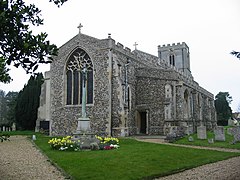Great Chesterford
| Great Chesterford | |
|---|---|
 All Saints' Church |
|
| Great Chesterford shown within Essex | |
| Population | 1,494 (2011) |
| OS grid reference | TL5143 |
| Civil parish |
|
| District | |
| Shire county | |
| Region | |
| Country | England |
| Sovereign state | United Kingdom |
| Post town | SAFFRON WALDEN |
| Postcode district | CB10 |
| Dialling code | 01799 |
| Police | Essex |
| Fire | Essex |
| Ambulance | East of England |
| EU Parliament | East of England |
| UK Parliament | |
Great Chesterford is a medium-sized village and civil parish in the Uttlesford district of Essex, England. It is located 18 miles (29 km) north of Bishop's Stortford, 12 miles (19 km) south of Cambridge and about 41 miles (66 km) north of London.
Great Chesterford is an ancient village with many listed buildings situated on the banks of the River Cam, or Granta, on the boundary of Essex and Cambridgeshire.
The church, All Saints', dates from the 13th century, and has had many additions over the years. Rumour has it that silver bells which hung in the church tower, were hidden in an underground passageway which ran between the church, the Old Vicarage and the Crown House Hotel to keep them safe from government soldiers. They have never been found, although some traces of the passageway have been uncovered.
The land around Great Chesterford has been inhabited for centuries, and there have been many archaeological finds e.g. Bronze Age beakers, Belgic pottery and jewellery, and many Roman artefacts which can be found in both Saffron Walden and Cambridge museums. In the 1st century AD, a Romano-British civil settlement was established near the river, occupying an important site en route between London, Cambridge and Newmarket. They erected many buildings, including a tax office, and a temple which was excavated to the east of the town near the Belgic cemetery. In the 4th century the Romans built a wall around the town – remains have been found and its exact location is known. In fact it passed underneath what is now the Crown House Hotel.
After the Romans left, it was presumed that there was continuity of occupation through the Saxon period, probably outside the Roman town. It was probably the location of a Saxon minster church, but the only actual evidence of Saxon occupation is found in the burial sites. Medieval development was in the centre of the village. The name Chesterford is first mentioned in a document in 1004, and again in 1086 in the Domesday Book. In 1459 the Rector, Thomas Hyll, endowed a charity for the benefit of needy parishioners. This still exists today.
...
Wikipedia

